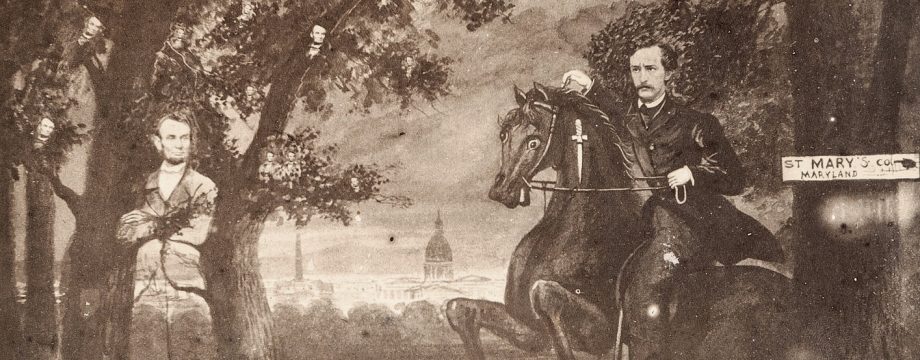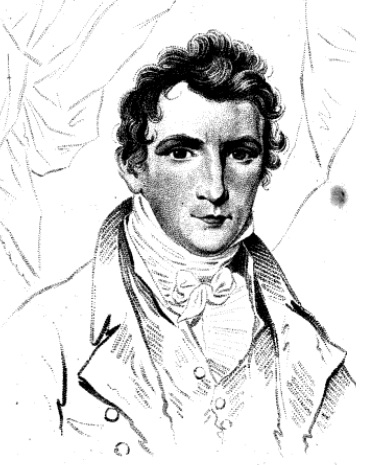I’m in the midst of reading the book, Junius Brutus Booth: Theatrical Prometheus by Stephen M. Archer. Though I’m only about 40 pages into it, I already have the book brimming with Post-It notes marking items of interest requiring further investigation. The most fascinating things I’ve come across thus far, is the drama that occurred when Junius Brutus Booth made his star debut in the theaters of London. In preparation for a post about the matter, I found myself with a wealth of material on the early theatrical life of Junius Brutus Booth. Instead of summarizing key points of Junius’ initial acting career, I decided to write a series of posts examining the humble acting beginnings of the man who would later father a theatrical dynasty, including the assassin of President Lincoln. What follows is a continuing part of a series of posts entitled, “When Junius Took the Stage”. Click here for Part 1 and here for Part 2 of the series.
Part 3 – When Junius Took a Wife
After a long and arduous journey, Junius Brutus Booth, a mere supporting player in the Jonas-Penley acting troupe, made it across the sea from London to Amsterdam. On Wednesday, May 18th, 1814, the company opened in Amsterdam’s High German Theatre playing the same play Booth had made his professional debut in five months earlier, The Honey Moon. Booth reprised his extremely minor role as the servant Campillo. Though Booth put on a good face and performed as required, his feet still hurt him greatly from his lonely trek the days before. For the next two nights’ performances, Junius did not appear.
Though appearing in the High German Theatre, the troupe performed in their native English. Therefore, witnessing the troupe’s performances was an interesting experience for many Dutch theatergoers. One non-English speaking theater goer was a man named Johannes Jelgerhuis. Though unable to follow the script, Jelgerhuis judged the troupe by their mannerisms and costumes and felt they were reasonably accomplished. Jelgerhuis was a graphic artist and made sketches of the cast’s wardrobe and notes on their scenery. So, while the Jonas-Penley troupe appealed more to the English tourists and English citizens in the different cities they visited in the continent, non-English speakers still attended their performances for the visual entertainment.

The troupe stayed three months in Amsterdam before moving on to Antwerp on July 22nd. Junius was struck by the beauties of the churches in Antwerp. He felt guilty and sinful about going to perform in a morally contemptuous theatre after visiting such holy structures.
By August the 14th, the troupe moved cities again, this time establishing themselves in Brussels. As Mr. Archer states, “Jonas and Penley had picked a propitious time for a Brussels engagement. Wellington’s defeat of Napoleon at nearby Waterloo on June 18th had swelled pro-British sentiment in the Netherlands; at no period in its history had Brussels so esteemed the English.” While a fortuitously profitable time for an English theatrical troupe, finding lodging in the militarily swollen Brussels became difficult. Left to his own devices, Junius found housing from a widow who lived close to the theatre.
His landlord’s name was Agatha Delannoy. He paid her seventeen francs a month and would ultimately board with her from August 14th until November 25th when the troupe departed for Ghent. The troupe only performed 36 times over the 104 days that Junius stayed under Madam Delannoy’s roof. This gave him ample time to get to know Ms. Delannoy’s four daughters, all of whom were between the ages of 19 and 24. There was Marie Josepha Agatha, Marie Christine Adelaide, Therese Eleonore, and Amelie Francoise Julienne. On August 25th, the birthday of the Prince of Orange, the troupe failed to perform as two of the actors did not show up. Junius foresaw this eventuality and had prearranged for two of Ms. Delannoy’s daughters to accompany him to see the celebration. Though not known with certainty, it is assumed that one of these “fine ladies” Booth escorted was Adelaide Delannoy. “Mimi” as she was nicknamed by her mother and sisters, was four years older than Junius, but the young actor was smitten. A romantic relationship evolved between the two over the course of his stay with the family and, when the troupe was poised to move on to Ghent on November 25th, reckless Adelaide eloped with Junius much to the dismay of her mother.
At least twice over the years, Junius recounted, with plenty of flair, the adventure the star crossed lovers experienced while fleeing from Adelaide’s disapproving family. According to one account, on the night of November 25th, the pair decided they would escape Adelaide’s family via a covered stagecoach. At the appointed hour, Junius stood beneath Adelaide’s window, while she lowered down to him a bundle of her favorite keepsakes and relics. While in the process of doing this, one of Adelaide’s sisters discovered Junius in the yard and, while raising the alarm, ejected Junius’ from the property. In the commotion that occurred, Adelaide was able to sneak off and make it to the carriage before it passed by the home. Junius was able to catch up with the stagecoach and join Adelaide. By this time Ms. Delannoy had called on the authorities to find and retrieve her misguided daughter and save her from this actor. Upon seeing the police approaching the wagon, Adelaide bundled herself under the seats of the carriage and covered herself with the large coat of another passenger. Junius, on the other hand, chose not to hide, but used his skill of acting to disguise his appearance: “He knew the perseverance of his opposers, wherefore, casting himself to the part of an invalid at the last extremity, pulling his cap and hat over his forehead, and assuming a cast [squint] in one eye, he sat mutely in a corner of the machine.” When the pursuers searched the stagecoach, they could find no persons matching the descriptions given to them by Ms. Delannoy, and the wagon continued its route to Ghent.
To the benefit of the pair, the Jonas-Penley Company did not stay in Ghent long, leaving the city after only six performances. By December 11th, the couple was in Bruges, having now successfully eluded Adelaide’s family. The troupe stayed in Bruges through New Year’s, departing for the coastal town of Ostend on January 2nd, 1815.
Ostend was too cold for Junius’ tastes. He called it “a most wretched place.” Though it could have undoubtedly happened prior to this time as well, in Ostend, Junius and Adelaide succeeded in using the timeless method of keeping warm in a cold climate: shared body heat. It was about this time in Ostend that Adelaide became pregnant. Though two others had accused and even successfully sued Junius for paternity when he was even younger, there is no doubt that this recently conceived child of Adelaide Delannoy’s was the child of 18 year-old Junius Brutus Booth.
It was while performing in Ostend that the Jonas-Penley Troupe began its round of benefit performances for all of its actors. Junius received his first of many theatrical benefits on Monday, March 13th. Junius performed Richard III and brought in twenty-three pounds. He had to pay the managers twelve pounds for expenses and he was given the remaining eleven.
It had been almost four months since Adelaide ran away with Junius when the latter had his first benefit. During the period in between, Junius had managed to reconnect with Ms. Delannoy, clearly not wanting to excessively worry the woman who would be his mother-in-law. Perhaps understanding the recklessness of youth and that further protests of their relationship would only alienate her daughter further, Ms. Delannoy tried instead to talk sense into Junius in regards to his career. Ms. Delannoy attempted to secure for Junius a more respectable vocation as a clerk’s stationer. In a letter from Junius to Adelaide’s mother dated March 17th, Junius acts interested in the position but is likely humoring the poor woman as he had done many times with his own father. He brags about his salary and prestige as an actor, exaggerating it greatly. Junius writes of wanting to live in Brussels, while he is simultaneously preparing to return to England at the end of the month. He ends the letter with, “I believe you are angry, but there is no cause for it.” I would have to disagree with Junius on that. Ms. Delannoy had justifiable reasons to be angry at the rash young actor who ran off with her daughter.
On March 31st, 1815, the Jonas-Penley Company, Junius, and Adelaide sailed back to England, their continental tour having ceased. His time abroad allowed Junius to act for the first time in some of the roles he would later make famous. Like a child learning to ride a bike, this tour served as Junius’ training wheels. While the continent gave him the skills, it would be the London theaters that would make him a star. But all that would come later.
Junius arrived back to the home of his father Richard. Dr. Archer succinctly states, “What explosions rocked Queen Street when the prodigal son introduced his pregnant Adelaide to Richard we can today only imagine.” No doubt motivated by the growing pregnancy and the urging of his father, Junius and Adelaide were married on May 8th, 1815, one week after Junius’ 19th birthday. The young actor was now married, expecting, and looking to make a name for himself on the London stages.
Stay tuned for the next installment where Junius find himself as one of the key players in a war that rocks the London theatres.
References:
Junius Brutus Booth: Theatrical Prometheus by Stephen Archer
Booth Memorials: Passages and Incidents and Anecdotes in the Life of Junius Brutus Booth by Asia Booth Clark
Memoirs of Junius Brutus Booth from his Birth to the Present Time







Another great post Dave! Let me know if you want the copy of the Lincoln Exhibition Catalog.
I read Archer’s book years ago – and I remember laughing at some of Mr. Booth’s rather unintentional antics. This is an excellent book – I know you’re enjoying it, Dave!
The worst part is that he died from drinking water from the Ohio River.
Pingback: The Son of John Wilkes Booth | BoothieBarn
Pingback: When Junius Took the Stage – Part 5 | BoothieBarn
Pingback: The Death of Amelia Booth | BoothieBarn